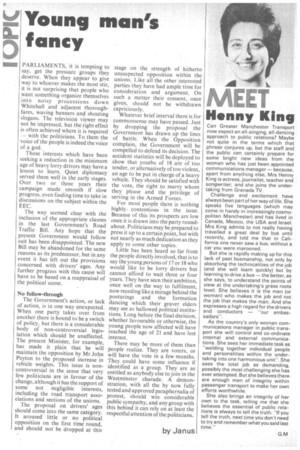Young man's fancy
Page 42

If you've noticed an error in this article please click here to report it so we can fix it.
PARLIAMENTS, it is tempting to say, get the pressure groups they deserve. When they appear to give way to whoever makes the most stir, it is not surprising that people who want something organize themselves into noisy processions down Whitehall and adjacent thoroughfares, waving banners and shouting slogans. The television viewer may not be impressed, but the right effect is often achieved where it is required – with the politicians. To them the voice of the people is indeed the voice of a god.
Those interests which have been seeking a reduction in the minimum age of heavy lorry drivers may have a lesson to learn. Quiet diplomacy served them well in the early stages. Over two or three years their campaign made smooth if slow progress, even finding time to take in discussions on the subject within the EEC.
The way seemed clear with the inclusion of the appropriate clauses in the last Government's Road Traffic Bill. Any hope that the present Government would follow suit has been disappointed. The new Bill may be abandoned for the same reasons as its predecessor, but in any event it has left out the provisions concerned with drivers' ages. Any further progress with this cause will have to be based on a reappraisal of the political scene.
No follow-through
The Government's action, or lack of action, is in one way unexpected. When one party takes over from another there is bound to be a switch of policy, but there is a considerable body of non-controversial legislation which should be unaffected. The present Minister, for example, has made it plain that he will maintain the opposition by Mr John Peyton to the proposed increase in vehicle weights. This issue is noncontroversial in the sense that very few politicians are in favour of the change, although it has the support of some not negligible interests, including the road transport associations and sections of the unions.
The proposal on drivers' ages should come into the same category. It aroused little or no political opposition on the first time round, and should not be dropped at this stage on the strength of hitherto unsuspected opposition within the unions. Like all the other interested parties they have had ample time for consideration and argument. On such a matter their consent, once given, should not be withdrawn capriciously.
Whatever brief interval there is for commonsense may have passed. Just by dropping the proposal the Government has drawn up the lines of battle. When the Opposition complain, the Government will be compelled to defend its decision. The accident statistics will be deployed to show that youths of 18 are of too tender, or alternatively of too violent, an age to be put in charge of a heavy vehicle. They should be satisfied with the vote, the right to marry whom they please and the privilege of serving in the Armed Forces.
For most people there is nothing highly. contentious in the issue. Because of this its prospects are low once it is drawn into the party roundabout. Politicians may be prepared to press it up to a certain point, but with not nearly as much dedication as they apply to some other topics.
Little has been heard so far from the people directly involved, that is to say the young persons of 17 or 18 who would like to be lorry drivers but cannot afford to wait three or four years. They have seen their ambition, once well on the way to fulfilment, now receding like a mirage behind the posturings and the formation dancing which their graver elders may see as hallowed political institutions. Long before the final decision, whether favourable or otherwise, the young people now affected will have reached the age of 21 and have lost interest.
There may be more of them than people realize. They are voters, or will have the vote in a few months. They could have some influence if identified as a group. They are as entitled as anybody else to join in the Westminster charade. A demonstration, with all the by now fully tested and approved paraphernalia of protest, should win considerable public sympathy, and any group with this behind it can rely on at least the respectful attention of the politicians.




























































































